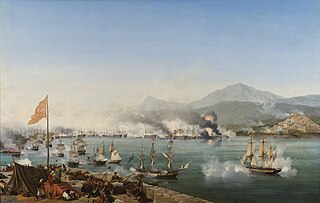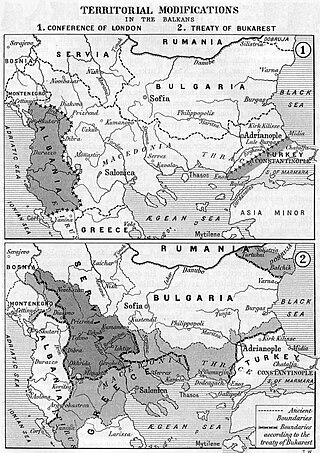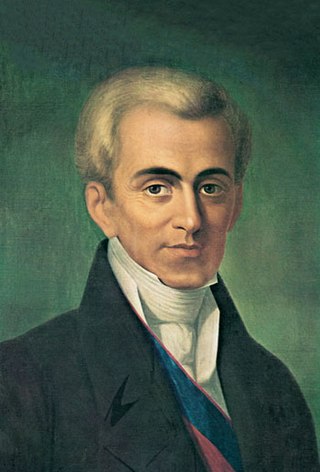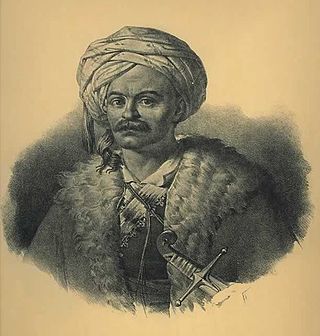Related Research Articles
The history of modern Greece covers the history of Greece from the recognition by the Great Powers — Britain, France and Russia — of its independence from the Ottoman Empire in 1828 to the present day.

The Battle of Navarino was a naval battle fought on 20 October 1827, during the Greek War of Independence (1821–1829), in Navarino Bay, on the west coast of the Peloponnese peninsula, in the Ionian Sea. Allied forces from Britain, France, and Russia decisively defeated Ottoman and Egyptian forces which were trying to suppress the Greeks, thereby making Greek independence much more likely. An Ottoman armada which, in addition to Imperial warships, included squadrons from the eyalets of Egypt and Regency of Algiers and Tunis, was destroyed by an Allied force of British, French and Russian warships. It was the last major naval battle in history to be fought entirely with sailing ships, although most ships fought at anchor. The Allies' victory was achieved through superior firepower and gunnery.

The Greek War of Independence, also known as the Greek Revolution or the Greek Revolution of 1821, was a successful war of independence by Greek revolutionaries against the Ottoman Empire between 1821 and 1829. In 1826, the Greeks were assisted by the British Empire, Kingdom of France, and the Russian Empire, while the Ottomans were aided by their vassals, especially by the Eyalet of Egypt. The war led to the formation of modern Greece, which would be expanded to its modern size in later years. The revolution is celebrated by Greeks around the world as independence day on 25 March.

Poros is a small Greek island-pair in the southern part of the Saronic Gulf, about 58 km south of the port of Piraeus and separated from the Peloponnese by a 200 m (656 ft) wide sea channel, with the town of Galatas on the mainland across the strait. Its surface area is about 31 square kilometres (12 sq mi) and it has 3,261 inhabitants (2021). The ancient name of Poros was Pogon. Like other ports in the Saronic, it is a popular weekend destination for Athenian travellers.

Enosis is an ideology calling for the incorporation of various Greek communities living outside of Greece into the Greek state. The idea is related to the Megali Idea, a concept of a Greek state that dominated Greek politics following the creation of modern Greece in 1830. The Megali Idea called for the reunification of all ethnic Greek lands, parts of which had participated in the Greek War of Independence in the 1820s but were unsuccessful and so remained under foreign rule.

The Treaty of London (1913) was signed on 30 May following the London Conference of 1912–1913. It dealt with the territorial adjustments arising out of the conclusion of the First Balkan War. The London Conference had ended on 23 January 1913, when the 1913 Ottoman coup d'état took place and Ottoman Grand Vizier Kâmil Pasha was forced to resign. Coup leader Enver Pasha withdrew the Ottoman Empire from the Conference, and the Treaty of London was signed without the presence of the Ottoman delegation.

Stratford Canning, 1st Viscount Stratford de Redcliffe, was a British diplomat who became best known as the longtime British Ambassador to the Ottoman Empire. A cousin of George Canning, he served as Envoy Extraordinary and Minister-Plenipotentiary to the United States of America between 1820 and 1824 and held his first appointment as Ambassador to the Ottoman Empire between 1825 and 1828.
The London Conference of 1832 was an international conference convened to establish a stable government in Greece. Negotiations among the three Great Powers resulted in the establishment of the Kingdom of Greece under a Bavarian prince. The decisions were ratified in the Treaty of Constantinople later that year. The treaty followed the Akkerman Convention which had previously recognized another territorial change in the Balkans, the suzerainty of the Principality of Serbia.

The First Hellenic Republic was the provisional Greek state during the Greek Revolution against the Ottoman Empire. From 1822 until 1827, it was known as the Provisional Administration of Greece, and between 1827 and 1832, it was known as the Hellenic State.

Count Ioannis Antonios Kapodistrias, sometimes anglicized as John Capodistrias, was a Greek statesman who was one of the most distinguished politicians and diplomats of 19th-century Europe.

The Autonomous Republic of Northern Epirus was a short-lived, self-governing entity founded in the aftermath of the Balkan Wars on 28 February 1914, by the local Greek population in southern Albania.

The London Protocol of 1830, also known as the Protocol of Independence in Greek historiography, was a treaty signed between France, Russia, and Great Britain on 3 February 1830. It was the first official international diplomatic act that recognized Greece as a fully sovereign and independent state, separate from the Ottoman Empire. The protocol afforded Greece the political, administrative, and commercial rights of an independent state, and defined the northern border of Greece from the mouth of the Achelous or Aspropotamos river to the mouth of the Spercheios river. As a result of the Greek War of Independence, which had broken out in 1821, the autonomy of Greece in one form or another had been recognized already since 1826, and a provisional Greek government under Governor Ioannis Kapodistrias existed, but the conditions of the Greek autonomy, its political status, and the borders of the new Greek state, were being debated between the Great Powers, the Greeks, and the Ottoman government.
The London Protocol of 22 March 1829 was an agreement between the three Great Powers, which amended the first London Protocol on the creation of an internally autonomous, but tributary Greek state under Ottoman suzerainty.

The Chios expedition was an unsuccessful attempt of the regular Greek army and irregular military units for the recapture of Chios island during the final stages of the Greek War of Independence. Chios had participated in the Greek uprising against the Ottoman Empire, but had been captured and its population massacred by the Ottoman fleet in 1822.
The Protocol of St. Petersburg was an 1826 Anglo-Russian agreement for the settlement of the Greek War of Independence.
The Conference of Poros was a meeting held in 1828 by British, French and Russian diplomats to determine the borders of independent Greece.
The Treaty of Constantinople of 2 April [O.S. 21 March] 1800 was concluded between the Ottoman Empire and the Russian Empire, and heralded the creation of the Septinsular Republic, the first autonomous Greek state since the fall of the Byzantine Empire in 1453.

The borders of Greece have changed nine times since the Protocol of London on March 22, 1829 until the accession of the Dodecanese in 1947.

Eastern Sporades or Eastern Islands was the name of one of the thirteen divisions created in 1828 with the administrative division of the newly formed Hellenic State by the government of Ioannis Kapodistrias.

The search for a candidate for the throne of Greece began soon after the start of the Greek War of Independence against the Ottoman Empire (1821–1829) and concluded two years after the international recognition of the country's independence in 1830, and was a pivotal moment in Greek history. The conflict was significantly shaped by the involvement of major European powers, namely the United Kingdom, Russia, and France, as well as internecine Greek conflicts during and after the War of Independence.
References
- ↑ William Wrigley, "The Ionian Islands & the Restoration of Anglo-Ottoman Diplomacy, 1827-29" Südost-Forschunge (2010/2011), Vol. 69/70, p51-89.